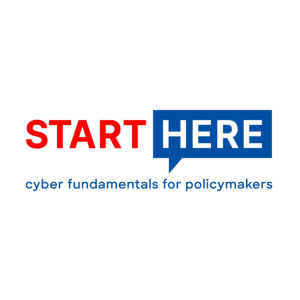START HERE: Cyber Fundamentals for Public Policymakers
START HERE aims to be your primer on the complex world of cyber policy, offering key insights for public policymakers. This podcast series bridges the knowledge gap in cyber policy and cybersecurity education, catering specifically to policymakers and leaders in public policy. Through a unique partnership between the academic expertise of American University’s Khan Cyber and Economic Security Institute, the cutting-edge technology insights from Crowdstrike, and the legal expertise of Wiley Rein, we delve into the nuances of cyber policy, security, and legal challenges facing today’s leaders. Our mission is to equip current and future policymakers with the tools and knowledge to navigate cybersecurity’s evolving landscape effectively. For feedback or inquiries, reach out to us at khaninstitute@american.edu and explore further resources at our website: https://shorturl.at/cnsE8
Episodes

Monday Jun 24, 2024
Monday Jun 24, 2024
On this episode of START HERE, join Sasha O'Connell, Drew Bagley, and Megan Brown as they navigate the crucial role of Congress in shaping U.S. cyber policy. This episode highlights how Congressional committees and lawmakers operate at the forefront of national cybersecurity efforts, coordinating responses, and setting policies.
Here's what you'll uncover in this episode:
Roles in Cyber Policy: Discover the critical roles played by Congress in formulating and enforcing U.S. cyber policy.
Congressional Structure: Learn about the structure of key Congressional committees, such as the House Committee on Homeland Security and the Senate Committee on Commerce, Science, and Transportation, and their impact on cybersecurity legislation.
Legislative Tools and Authorities: Understand the tools and authorities Congress utilizes to influence cyber policy, including drafting legislation, oversight functions, and budgetary control.
Policy Influence: Explore where Congress tends to play in the policy space, from creating comprehensive cybersecurity strategies to addressing emerging threats through new laws.
Recent Trends: Dive into recent trends in Congressional action on cybersecurity, such as initiatives to protect critical infrastructure, enhance public-private partnerships, and respond to increasing cyber threats.
Stakeholder Engagement: Learn how stakeholders from the private sector, academia, civil society, and beyond can engage with Congress to have their voices heard and influence cyber policy decisions.
Don't miss this detailed breakdown of how Congress is a key player in U.S. cyber policy, working tirelessly to safeguard the nation's digital infrastructure. Subscribe now to stay informed and engaged with the latest insights and discussions!
Got feedback or questions? Reach out to us at khaninstitute@american.edu.

Monday Jul 08, 2024
Monday Jul 08, 2024
On this episode of START HERE, join Sasha O'Connell, Drew Bagley, and Megan Brown as they navigate the crucial role of states in shaping U.S. cyber policy. This episode highlights how state governments operate at the forefront of national cybersecurity efforts, coordinating responses, and setting policies.
Here's what you'll uncover in this episode:
Roles in Cyber Policy: Discover the critical roles played by states in formulating and enforcing U.S. cyber policy.
State Structure: Learn about the structure of key state agencies and offices responsible for cybersecurity, such as state Departments of Information Technology and Offices of Homeland Security, and their impact on cybersecurity efforts.
Tools and Authorities: Understand the tools and authorities states utilize to influence cyber policy, including state-level legislation, regulatory measures, and emergency response capabilities.
Policy Influence: Explore where states tend to play in the policy space, from protecting state infrastructure and data to collaborating with federal agencies and other states on broader cybersecurity initiatives.
Recent Trends: Dive into recent trends in state action on cybersecurity, such as efforts to secure election systems, enhance public-private partnerships, and develop workforce training programs to address the growing demand for cybersecurity professionals.
Stakeholder Engagement: Learn how stakeholders from the private sector, academia, civil society, and beyond can engage with state governments to have their voices heard and influence cyber policy decisions.
Don't miss this detailed breakdown of how states are key players in U.S. cyber policy, working tirelessly to safeguard the nation's digital infrastructure. Subscribe now to stay informed and engaged with the latest insights and discussions!
Got feedback or questions? Reach out to us at khaninstitute@american.edu.


